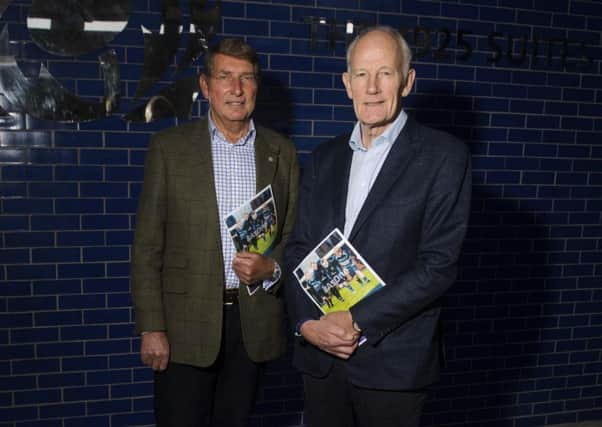Comment: Independent Review places too much emphasis on top of the game and not enough on grassroots


As professional businessmen of long standing, Gammell and Murray have seen company structures that are too unwieldy and others that are more streamlined and efficient. The aim of their report has been to recommend a significantly altered structure for the SRU – one that, in their view, will better fit it for the challenges ahead, especially the possibility of significant external investment from companies such as CVC.
As a principle, that intention may be laudable. But the SRU, unlike Cairn Energy and the other companies for which the report’s authors have worked, is a lot more than a professional company. It is a governing body which should be concerned with nurturing the sport as a whole, not just the bits that make money. And over the length of the briefing, as well as in the report itself, it became apparent that Gammell and Murray have placed too much emphasis on the very top of the game and not enough on the grassroots.
Advertisement
Hide AdAdvertisement
Hide AdThey pay lip service to the club game, and insist that those member clubs will still be the ultimate controllers of the Union. But when it comes to their recommendations for appointing board members, time after time they want to diminish the power of the clubs, and hand that power to a small group of senior executives.
So clubs will still be able to nominate members of some committees, but those executives will get to choose whose faces fit. And, as has become apparent to any interested observer of Scottish Rugby over the past few years, those executives do not have a habit of welcoming a plurality of opinions.
Somewhat idealistically, Gammell insisted he wanted to draw a line under past events and enable the SRU to start with a clean slate. Such events as the unfair dismissal of Keith Russell, he implied, were better disregarded for the greater good.
“The difficulty I think we have, whatever the past situations may be, is lots of people have different views, different understandings, a question about transparency or whatever – I don’t know,” he said when pressed on that matter.
“What we are trying to say is this has to be transparent. You have to have something that you look at the board and say ‘Do you know what, I really admire Scottish Rugby, because they’ve got their act together. Between us all, we’ve found a way where good people are coming in at the right place’.
“I’m Mr Positivity and I’d just love Scotland to be proud. How great do we feel about the fact that we’re filling the stadium? There’s a lot of fantastic, great stuff in Scottish Rugby, but it gets drowned by all the difficulties. But at the end of the day, we’ve got to find a board and an executive that are empowered and supported to run a business.”
Which is where trust comes in. Because, whether Gammell wishes it away or not, the reality is that a significant proportion of the Scottish rugby public does not have an admiration for senior figures within the organisation such as chief executive Mark Dodson, pictured inset, or current chairman Colin Grassie.
The issue of trust came up again when Gammell was asked when we might get to see the Articles of Association of the new, reformed company. “The Articles of Association will be available once or if the clubs in principle endorse the proposals,” he replied. “I’d love to see trust in this overview, because basically, you’re trying to say we need everybody to trust that there is an organisation and structure and people populating that everybody gets behind.”
Advertisement
Hide AdAdvertisement
Hide AdWhen it was suggested to him that there is a massive issue of trust or lack of trust between Murrayfield and the wider rugby public, he referred to the SRU’s slogan, “As One”. “I think what we’re proposing is a fresh slate to hopefully start again and move forward. ‘As One’. Wouldn’t it be wonderful if we talked as one at some point?”
No, it wouldn’t actually, because new, creative ideas rarely if ever come from unanimity.
And speaking of unanimity, before the meeting, SRU employees told journalists that the Board and Council had approved the report – although they were unable to say if that was unanimous or just majority approval, or indeed how that approval might be measured. At the meeting itself, Gammell said the Council and Board had “bought into it”. Asked if he understood there had been anything amounting to a formal vote, he replied: “Decisions have to be made. I don’t think it’s that complex. It’s entirely up to the clubs, but I would say there was very strong support from both the Board and the Council.”
It depends on how you define “very strong”, of course, but it does appear that, so far at least, the Board and Council have only given their approval to the report’s being published, not to its substance. On the council in particular there are understood to be several dissenting voices, some of whom are aghast at what they see as an attempted power grab. Their trust will be very hard to win, and for good reason.